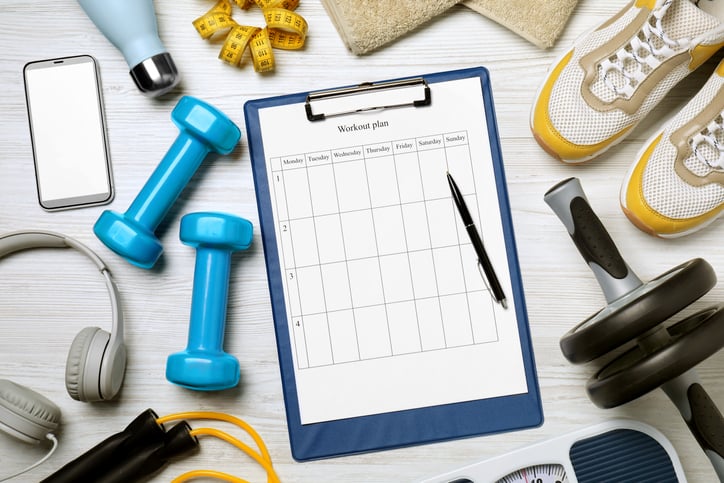In a world inundated with one-size-fits-all fitness programs, it’s easy to feel lost in a sea of generic advice and cookie-cutter routines. But fear not, for creating a personalized fitness plan tailored specifically to your unique needs and goals is not only possible, but essential for long-term success. In this article, we will explore the art of crafting a personalized fitness plan that resonates with your individuality, fuels your motivation, and empowers you to reach new heights of health and vitality. So grab your water bottle and mat, and let’s embark on this journey to fitness freedom together.

Assessing Your Current Fitness Level
To create an effective personalized fitness plan, it is essential to first assess your current fitness level. This will help you determine your strengths and weaknesses, as well as set realistic goals for your fitness journey. There are several key factors to consider when evaluating your fitness level:
- Cardiovascular Endurance: Assess how well your heart and lungs perform during activities that require sustained effort, such as running, biking, or swimming.
- Muscular Strength and Endurance: Evaluate the strength and endurance of your muscles by performing exercises like push-ups, squats, and planks.
- Flexibility: Determine your level of flexibility by testing your range of motion in various joints and muscles.
- Body Composition: Measure your body fat percentage and overall muscle mass to understand your body composition.
Once you have gathered this information, you can use it to tailor a fitness plan that suits your unique needs and goals. Whether you are looking to lose weight, build muscle, or improve your overall health, knowing where you currently stand will guide you in creating a plan that is both effective and sustainable.
In the table below, you can track your progress as you assess your current fitness level. Use this as a tool to monitor your improvements over time and adjust your fitness plan accordingly.
| Fitness Component | Initial Assessment | Target Goal |
|---|---|---|
| Cardiovascular Endurance | 10-minute run | 30-minute run |
| Muscular Strength | 10 push-ups | 30 push-ups |
| Flexibility | Touching toes | Full splits |
| Body Composition | 25% body fat | 20% body fat |
To start, take some time to reflect on what you hope to achieve through your fitness plan. Whether you want to lose weight, build muscle, improve your endurance, or simply lead a healthier lifestyle, clearly define your goals in a way that is meaningful to you. Remember to make your goals challenging but attainable, as pushing yourself beyond your limits can lead to burnout or injury.
Once you have established your goals, break them down into smaller, manageable steps. This will help you stay focused and committed to your plan, as you can celebrate each milestone along the way. Consider creating a timeline for achieving each goal, and be sure to adjust your plan as needed based on your progress. Remember, the key to success is consistency and determination. By setting clear and achievable goals, you can create a personalized fitness plan that will help you realize your full potential.
Choosing the Right Types of Exercises
When it comes to creating a personalized fitness plan, choosing the right types of exercises is key to reaching your goals effectively. By selecting exercises that align with your fitness level, interests, and overall objectives, you can maximize the impact of your workout routine.
One important factor to consider when selecting exercises is to incorporate a mix of cardio, strength training, and flexibility exercises. This balanced approach will help improve your overall fitness level, increase muscle tone, and enhance your flexibility.
Additionally, it’s essential to choose exercises that you enjoy and that keep you motivated. Whether it’s dancing, hiking, weightlifting, or yoga, finding activities that you look forward to will help you stay consistent and committed to your workout routine.
Remember, it’s also important to consult with a fitness professional or personal trainer to ensure you are performing exercises correctly and safely. They can provide guidance on proper form, technique, and progression to help you achieve optimal results.
Incorporating Variety and Progression
When it comes to creating a personalized fitness plan, it’s important to incorporate variety and progression to keep things interesting and challenging. By including a mix of different exercises and gradually increasing the intensity over time, you can ensure that you are constantly pushing yourself to reach new goals and see improvements in your fitness levels.
One way to incorporate variety into your workout routine is to try different types of exercises, such as cardio, strength training, and flexibility exercises. This not only helps to target different muscle groups and prevent boredom, but it also ensures that you are working on all aspects of your fitness.
Additionally, it’s important to gradually increase the intensity of your workouts to see continued progress. This can be done by adding more weight, increasing the duration of your workouts, or trying more challenging variations of exercises. By tracking your progress and making small adjustments along the way, you can stay motivated and continue to see improvements in your overall fitness.
In conclusion, creating a personalized fitness plan is a crucial step towards achieving your health and wellness goals. By following the steps outlined in this article, you can design a plan that is tailored to your specific needs, preferences, and lifestyle. Remember to listen to your body, stay consistent, and stay motivated on your fitness journey. With dedication and determination, you can unleash your full potential and become the healthiest version of yourself. Embrace the process, trust in yourself, and enjoy the transformation that awaits you. Here’s to a healthier, happier you!



Comments are closed.